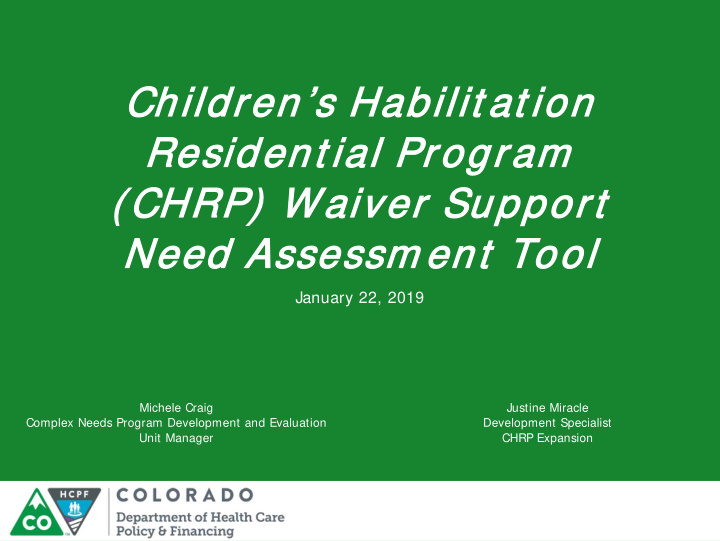



Childre ren’s Habilit at ion Resident ial Pro rogra ram ( CHRP) Waiver r Support rt Need eed Assessm ssessm en ent Tool January 22, 2019 Michele Craig Justine Miracle Complex Needs Program Development and Evaluation Development Specialist Unit Manager CHRP Expansion
Our M r Mis ission ion I mproving health care access and outcomes for the people we serve while demonstrating sound stewardship of financial resources
CHRP Expans nsion n Up Updat e t es Michele Craig– Complex Needs Program Development and Evaluation Unit Supervisor Justine Miracle- Development Specialist, CHRP Expansion
Office of Community Living Vision
The What The Department received the authority through HB 18-1328 to expand the CHRP waiver to better serve these children. Modifications will include: Removal of requirement that the child be in foster care. Transfer of administration of the CHRP waiver from the CDHS to the Department. Transfer of case management from child welfare agencies to Case Management Agencies (specifically Community Centered Boards-CCBs). Addition of two services to the waiver to mitigate the need for an out of home placement and facilitate returns to the home once stabilized.
The How and The When 1. Engage stakeholders on new benefits August-February 2019 2. Renew the waiver with CMS March-June 2019 3. Promulgate rules and regulations February-June 2019 4. Training on expanded CHRP waiver April-June 2019 5. Transition to expanded CHRP waiver February-June 2019
Children en’s s Assessm ssessm en ent Tool ool Updat e Justine Miracle- Development Specialist, CHRP Expansion
Youth and Child Serving Systems Colorado Department of Human Services Office of Behavioral Health; CYMHTA Child-welfare Health Care Policy and Financing HCBS-CHRP Waiver Residential Child Care Facility and Psychiatric Residential Treatment Facilities benefit Behavioral health, Regional Accountable Entities (RAE) Families First Prevention Services Act (FFPSA) Child Welfare Service Delivery Task Force
Support Need eed Lev evel el Assessm ssessm en ent Tool Michele Craig- Complex Needs Program Development and Evaluation Unit Supervisor
Department Evaluation of Assessment Tools Based on stakeholder feedback, the Department evaluated options for which assessment tool to use to determine need support level: Inventory for Client and Agency Planning (ICAP) Child and Adolescent Needs and Strengths (CANS) New Long Term Services and Supports (LTSS) standardized assessment (in development)
Outcome of Department Evaluation Continue use of ICAP during the first 6-12 months of the start date of renewed waiver Why?- Need more time Comparison of actual assessment scoring results Budget impact Reimbursement methodology development Other child and youth serving systems
Next Steps Participate in assessment discussion for other child and youth serving systems Train case managers on ICAP Possible user testing of CANS Comparison of CANS with new LTSS tool
13 Questions, Concerns, Comments?
Tha hank nk you! u! Contact Information: Justine Miracle| 303-866-5919 | justine.miracle@state.co.us Michele Craig | 303-866-5147 | michele.craig@state.co.us
Recommend
More recommend